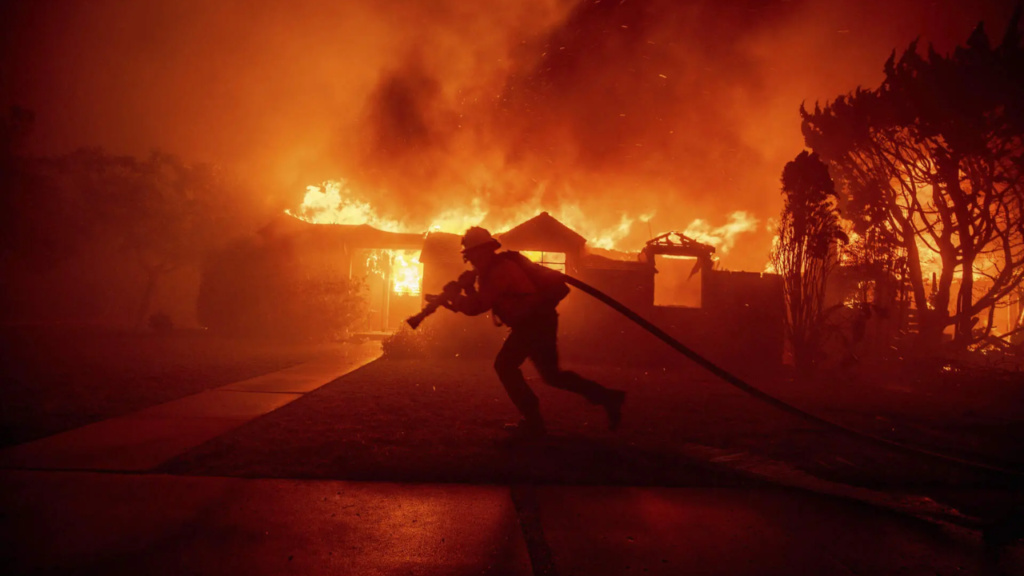Wildfires have long been a natural phenomenon in California, but the latest Los Angeles Wildfire has escalated into an unprecedented disaster. The ongoing fires, fueled by fierce winds and dry conditions, are poised to become one of the costliest natural disasters in United States history.
AccuWeather estimates the damages and economic losses could reach between $52 billion and $57 billion. This catastrophe has not only wreaked havoc on the landscape but has also displaced thousands of residents, destroyed valuable property, and raised questions about the long-term impact of climate change on wildfire patterns.
The Scale of the Los Angeles Wildfire
Los Angeles, known for its sunny skies and iconic neighborhoods, now finds itself grappling with an inferno of immense proportions. The fires, which ignited earlier this week, have already swept through affluent areas like Santa Monica and Malibu, where median home values exceed $2 million.
These fires are not just localized incidents; they are massive, with flames driven by hurricane-force winds that threaten to spread further. The destruction has left entire neighborhoods in ashes, while emergency services struggle to contain the flames and evacuate residents.
Full coverage Of Los Angeles wildfire : Click
AccuWeather’s chief meteorologist, Jonathan Porter, has labeled this wildfire as “one of the worst in California history.” Should the fires continue their destructive path, they might surpass even the infamous Camp Fire of 2018, which caused $30 billion in damages and took 85 lives.
Read : Mandatory Evacuations Underway as 900-Acre Wildfire Rages Near Yosemite National Park in California
The toll on human life is also mounting, with at least five fatalities reported and over 130,000 people forced to evacuate their homes. This large-scale displacement has created a humanitarian crisis, with shelters overwhelmed by evacuees and resources stretched thin.
Economic and Environmental Costs
The projected economic loss of up to $57 billion places this wildfire among the most expensive disasters in U.S. history. For comparison, Hurricane Katrina in 2005 remains the costliest, with damages estimated at $200 billion. However, the Los Angeles wildfire’s impact extends beyond immediate property loss.
The destruction of homes, infrastructure, and businesses will have long-term repercussions on the local economy. Tourism, a significant revenue generator for Los Angeles, is likely to suffer as the city’s iconic landscapes and neighborhoods are charred by flames.

Moreover, the health impact cannot be ignored. The wildfire has released massive amounts of smoke and pollutants into the air, creating hazardous conditions for residents. Prolonged exposure to such air quality can lead to respiratory issues, cardiovascular problems, and other long-term health concerns.
The environmental cost is equally severe, with ecosystems destroyed and wildlife displaced. The recovery of these natural habitats will take years, if not decades, to restore fully.
The Role of Climate Change and Future Implications
The Los Angeles wildfire is not just a natural disaster; it is a stark reminder of the escalating impact of climate change. Rising temperatures, prolonged droughts, and stronger winds have created a perfect storm for wildfires to ignite and spread rapidly. Experts warn that these conditions will only worsen in the coming years, making such catastrophic events more frequent and intense.
The destruction wrought by this wildfire also highlights the urgent need for policy changes and investment in fire prevention and mitigation strategies. Building resilient infrastructure, improving emergency response systems, and managing forested areas more effectively are crucial steps in reducing future risks.

Additionally, addressing the root causes of climate change through global cooperation and reducing greenhouse gas emissions is essential in mitigating the conditions that lead to such disasters.
In the immediate aftermath of the fire, the focus will be on recovery and rebuilding. However, the lessons learned from this disaster must guide future efforts to prevent similar tragedies. With billions of dollars at stake and countless lives affected, the Los Angeles wildfire serves as a wake-up call for policymakers, environmentalists, and citizens alike.
As the flames continue to burn, the story of this wildfire is far from over. The resilience of the affected communities and the effectiveness of emergency response efforts will determine the final toll of this disaster. In the meantime, the Los Angeles wildfire stands as a grim testament to the destructive power of nature and the pressing need for sustainable solutions to combat its impacts.

